Mozambican elections should end with the losers congratulating the winners - Daniel Chapo
“We must continue giving President Filipe Nyusi the benefit of the doubt” – Luis de Brito
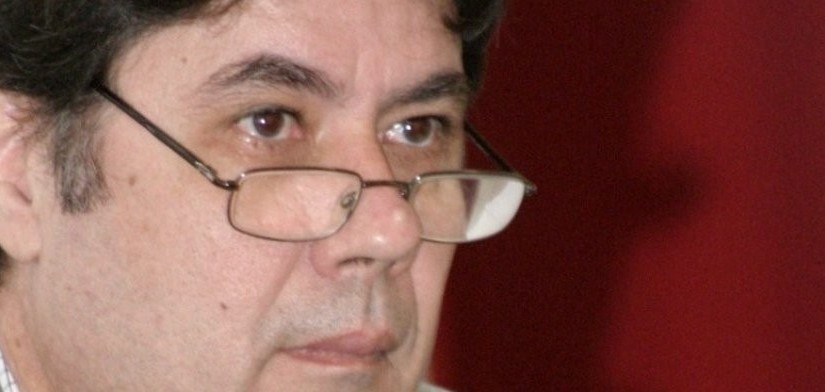
File photo / Luis de Brito
After two years of the presidency of Filipe Jacinto Nyusi, we must continue to give him “the benefit of the doubt,” says Professor of Anthropology and Sociology of Politics Luís de Brito. “I think we can give the benefit of the doubt to those who are younger, those who didn’t sell out the country, but who now have the difficult task of rescuing the Country and its dignity.”
In an interview with @Verdade Professor de Brito also draws attention to the fact that, although history shows us that it is impossible to foresee the future, “it also shows that where popular dissatisfaction is very strong, there is more likely to be violent outbursts, and we know that popular dissatisfaction in Mozambique is strong and has been growing”.

“In 2015, President Nyusi said he was not satisfied with the state of the nation and this speech was welcomed at the time because it implied that we had turned the page on the baseless triumphalism that had been manifesting itself in previous years, when it was well known that economic growth was not being reflected in the improvement of the living conditions of the majority of Mozambicans. Curiously, now, in 2016, the president used the image that the country was determined to meet the challenges. He did not say that the state of the nation was good, or even reasonable, but he avoided, with this formula, having to say clearly that the country’s situation is bad and that the coming times will be difficult, especially for the poor majority of the population and the middle classes,” the university professor replies when asked by @Verdade to comment on Filipe Nyusi’s second State of the Nation address to the Assembly of the Republic in December[2016].
In de Brito’s view, “Although one cannot say that the triumphalist discourse has returned, it is noted that there is great difficulty in calling things by their names, and that openly acknowledging difficulties is something that is not in Frelimo’s DNA. Now, in a society where information flows much more than a few years ago and where the general level of education is rising, this attitude is counterproductive and causes a greater rejection of power on the part of citizens because they know that their lives are not standing firm at all. On the contrary. So, what does it mean to say that the country stands firm [firme] ?”
“I think we can give the benefit of doubt to those who have not sold the country”
@Verdade asked the professor of the Faculty of Letters and Social Sciences of Eduardo Mondlane University (UEM) if, as in 2015, he continued to give the benefit of the doubt to the fourth president of Mozambique. “We have to give him the benefit of the doubt, even if we are intimately convinced that, up until now, the paths chosen for the country’s governance take us ever further from the ideals of the struggle for independence.”
“We have to give the benefit of the doubt also because it was not President Nyusi who created this huge crisis. He inherited the problems created by others. And this reminds me that when Frelimo discussed who should be its presidential candidate for 2004 and there appeared a series of “young” candidates, such as Hélder Muteia, Eduardo Mulembwe, etc., these had no chance, because there appeared some figures saying that the young people would sell out the country. […] After all that, who did sell out the country? So I think we can give the benefit of the doubt to those who are younger, those who have not sold out the country, but who now have the difficult task of rescuing the Country and its dignity. It will not be easy,” Luís de Brito writes in an e-mail interview.
Regarding the power that Filipe Nyusi did not have within the Frelimo party when he assumed the leadership of the Mozambican state, the professor continues to think that he still does not have it. “Of course, from the formal point of view, Nyusi has all the powers. In fact, that’s not quite the case,” he says.
“He has yet to develop his base of support, and overcome much resistance and interests within his party and the state. That is why we do not yet know what will happen with the hidden debt process, how and when the country will once again be able to count on the support of the IMF and donors. All these uncertainties, in my opinion, show that the President still does not have enough space to implement his policy. Neither in relation to the debt crisis, nor in relation to the internal war. Let’s see what happens at the next Frelimo congress, even if we know that a lot of the game is being played outside this body,” writes Luis de Brito, who is also director of research and coordinator of the Research Group on Citizenship and Governance at the Institute for Economic and Social Studies (IESE).

“Extreme poverty is increasing, the people are tightening their belts, but the revolt is there.”
Regarding the war, which has entered [a phase of] truce since the end of December, the interviewee writes that, “I do not know of any war that has been resolved by a phone call and I do not think it is possible. We have a truce, which is much better than being in armed conflict, but there is still no guarantee that the negotiations will result in a peace agreed between the parties and definitive”.
According to Professor Luis de Brito, “We have already seen from experience that the peace of Rome, of 1992, was, after all, nothing more than a postponement of war, although it could have been a definitive peace if there had been the will and the commitment of all. I do not know if in March we will hear the [same] song again. I hope not, but I know that restoring the conditions of democratic coexistence among all Mozambicans is a great challenge. And to a great extent the problem is: how can democracy be made without democrats, and how can a democratic state be built without citizens? It’s almost like wanting to make an omelette without eggs. Let’s then wait for the chicken to quickly lay the eggs.”
As to the economic crisis, particularly the cost of living that was already unsustainable when Nyusi took office, and has become much worse since, the UEM Faculty of Letters and Social Sciences professor says that “the situation remains explosive”.
“The fact that people are surviving and facing all the difficulties and increases in the cost of living does not mean that the problem is solved. The problem continues and is even getting worse. That is why the explosion may happen at any moment. This is not to say that it is inevitable. It just means that the conditions for it are all met,” he explains.
In addition, “extreme poverty is increasing, the people are tightening their belts, but the revolt is there. If the occasion arises, the revolt will be expressed. It could be a violent expression such as we have seen in the past, but it could also be a peaceful, civic expression in the elections, which would be the ideal scenario”.
“We could also have post-electoral violence again if the elections do not go well. History shows us that it is impossible to predict the future, but it also shows that where popular dissatisfaction is too great there is more likely to be violent outbursts. And we know that popular dissatisfaction in Mozambique is great and has been growing,” Professor de Brito predicts.
Temos de continuar a dar o benefício da dúvida ao Presidente Filipe Nyusi, professor Luís de Brito
Após dois anos de Presidência de Filipe Jacinto Nyusi, temos de continuar a dar-lhe “o benefício da dúvida (…) acho que podemos dar o benefício da dúvida aos que são mais jovens, os que não venderam o país, mas que têm agora a difícil tarefa de resgatar o País e a sua dignidade”, afirma Luís de Brito, professor de Antropologia e Sociologia da Política, em entrevista ao @Verdade onde ainda chama a atenção para o facto de embora a história mostrar-nos que é impossível prever futuro, “também mostra que lá onde a insatisfação popular é muito grande há mais probabilidades de explosões de violência. E nós sabemos que a insatisfação popular em Moçambique é grande e tem estado a crescer”.
“Em 2015, o Presidente Nyusi disse que não estava satisfeito com o estado da nação e esse discurso foi bem acolhido na altura porque dava a entender que tínhamos virado a página do triunfalismo sem base que se vinha manifestando nos anos anteriores, quando se sabia bem que o crescimento económico não se estava a reflectir na melhoria das condições de vida da maioria dos Moçambicanos. Curiosamente, agora, em 2016, o Presidente usou a imagem de que o país estava firme para enfrentar os desafios. Não disse que o estado da nação estava bom, nem sequer razoável, mas evitou, com essa fórmula, ter que dizer claramente que a situação do País está péssima e que os próximos tempos serão difíceis, sobretudo para a maioria pobre da população, mas também para as camadas médias”, começa por declarar o professor universitário quando instado pelo @Verdade a comentar o segundo discurso sobre Estado da Nação que Filipe Nyusi proferiu em Dezembro na Assembleia da República.
Na óptica de Luís de Brito, “Embora não se possa dizer que voltou o discurso triunfalista, nota-se que há uma grande dificuldade em chamar as coisas pelos seus nomes, e que reconhecer abertamente as dificuldades é qualquer coisa que não está no ADN da Frelimo. Ora, numa sociedade em que a informação circula muito mais do que há alguns anos e em que o nível geral de educação está a subir, essa atitude é contraproducente e provoca uma maior rejeição do poder por parte dos cidadãos porque eles sabem que a sua vida não está nada firme, pelo contrário. Então, o que é que significa dizer que o país está firme?”.
Acho que podemos dar o benefício da dúvida aos que não venderam o País
O @Verdade perguntou ao professor da Faculdade de Letras e Ciências Sociais da Universidade Eduardo Mondlane(UEM) se, tal como em 2015, continuava a dar o benefício da dúvida ao quarto Presidente de Moçambique. “Temos que dar o benefício da dúvida, mesmo se estamos intimamente convencidos que, até agora, os caminhos escolhidos para a governação do país nos levam para cada vez mais longe do ideal da luta pela independência”.
“Temos que dar o benefício da dúvida também porque não foi o Presidente Nyusi quem criou esta crise enorme. Ele herdou os problemas criados pelos outros. E isso me faz recordar que quando a Frelimo discutia quem deveria ser o seu candidato presidencial para 2004 e apareceram uma série de “jovens” candidatos, como Hélder Muteia, Eduardo Mulembwe, etc, esses não tiveram nenhuma chance, porque apareceram algumas figuras a dizer que os jovens iriam vender o País… Afinal quem vendeu o País? Portanto, acho que podemos dar o benefício da dúvida aos que são mais jovens, os que não venderam o país, mas que têm agora a difícil tarefa de resgatar país e a sua dignidade. Não vai ser fácil”, aclarou Luís de Brito neste entrevista feita por correio electrónico.
Relativamente ao poder que Filipe Nyusi não tinha dentro do partido Frelimo, quando assumiu a chefia do Estado moçambicano, o professor continua a pensar que continua sem tê-lo. “Claro que, do ponto de vista formal, Nyusi tem todos os poderes. Na realidade, isso não é bem assim”.
“Ele tem ainda que desenvolver a sua base de apoio, tem que vencer muitas resistências e interesses instalados no seio do seu partido e do Estado. É por isso que não sabemos ainda o que se vai passar com o processo das dívidas ocultas, como e quando é que o país vai voltar a poder contar com o apoio do FMI e dos doadores. Todas essas indefinições, na minha opinião, mostram que o Presidente ainda não tem o espaço suficiente para implementar a sua política. Nem em relação à crise da dívida, nem em relação à guerra interna. Vamos ver o que se passa no próximo congresso da Frelimo, mesmo se sabemos que muita coisa se joga fora desse órgão”, disse Luís de Brito, que é também director de investigação e coordenador do Grupo de Investigação sobre Cidadania e Governação no Instituto de Estudos Sociais e Económicos(IESE).
“A miséria vai aumentando, o povo vai apertando o cinto, mas a revolta está lá”
Sobre a guerra, que desde final de Dezembro entrou em tréguas, o nosso entrevistado afirma que “Não conheço nenhuma guerra que tenha sido resolvida com um telefonema e não me parece que isso seja possível. Temos uma trégua, o que é muito melhor do que estarmos no conflito armado, mas ainda não há nenhuma garantia que as negociações resultem numa paz acordada entre as partes e definitiva”.
Segundo o professor Luís de Brito, “Já vimos pela experiência que a paz de Roma, de 1992, afinal não era mais do que um adiamento da guerra, embora tivesse podido ser uma paz definitiva se tivesse havido a vontade e o interesse de todos nisso. Não sei se em Março vamos voltar a ouvir o canto das armas, espero que não, mas sei que restabelecer as condições de convivência democrática entre todos os Moçambicanos é um grande desafio. E em grande parte o problema é: como se pode fazer a democracia sem democratas e como se pode edificar um Estado democrático sem cidadãos? É quase como querer fazer a omelete sem ovos. Vamos então esperar que a galinha ponha os ovos rapidamente”.
No que a crise económica diz respeito, particularmente sobre o custo de vida que já estava insustentável quando Nyusi assumiu o cargo, e tornou-se muito pior desde então, o professor da Faculdade de Letras e Ciências Sociais da UEM declara que “a situação continua explosiva”.
“O facto de as pessoas irem sobrevivendo e enfrentando todas as dificuldades e aumentos do custo de vida não significa que o problema esteja resolvido. O problema continua e até se vai agravando. Por isso em qualquer momento pode acontecer a explosão. Isso não quer dizer que seja inevitável. Quer dizer apenas que as condições para isso acontecer estão todas reunidas”, explicou.
Além disso, “A miséria vai aumentando, o povo vai apertando o cinto, mas a revolta está lá. Se a ocasião se proporcionar essa revolta vai-se exprimir. Pode ser uma expressão violenta, como já vimos no passado, mas também pode ser uma expressão de uma forma cívica e pacífica nas eleições, o que seria o cenário ideal”.
“Também podemos ter violência pós-eleitoral de novo, se as eleições não decorrerem de forma satisfatória. A história mostra-nos que é impossível prever futuro, mas também mostra que lá onde a insatisfação popular é muito grande há mais probabilidades de explosões de violência. E nós sabemos que a insatisfação popular em Moçambique é grande e tem estado a crescer”, prognosticou o professor Luís de Brito.


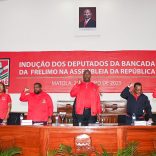


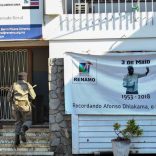
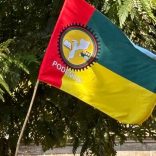
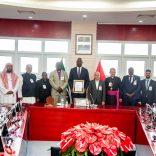




Leave a Reply
Be the First to Comment!
You must be logged in to post a comment.
You must be logged in to post a comment.